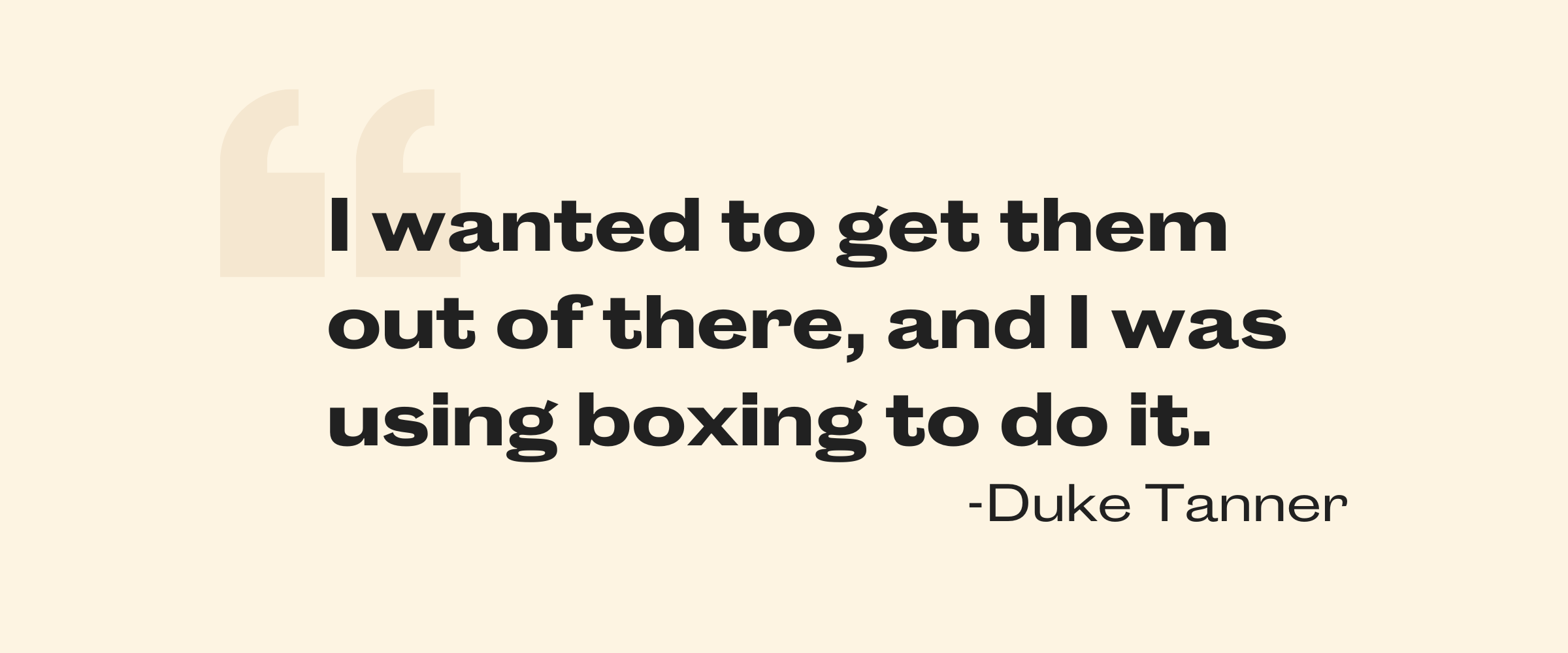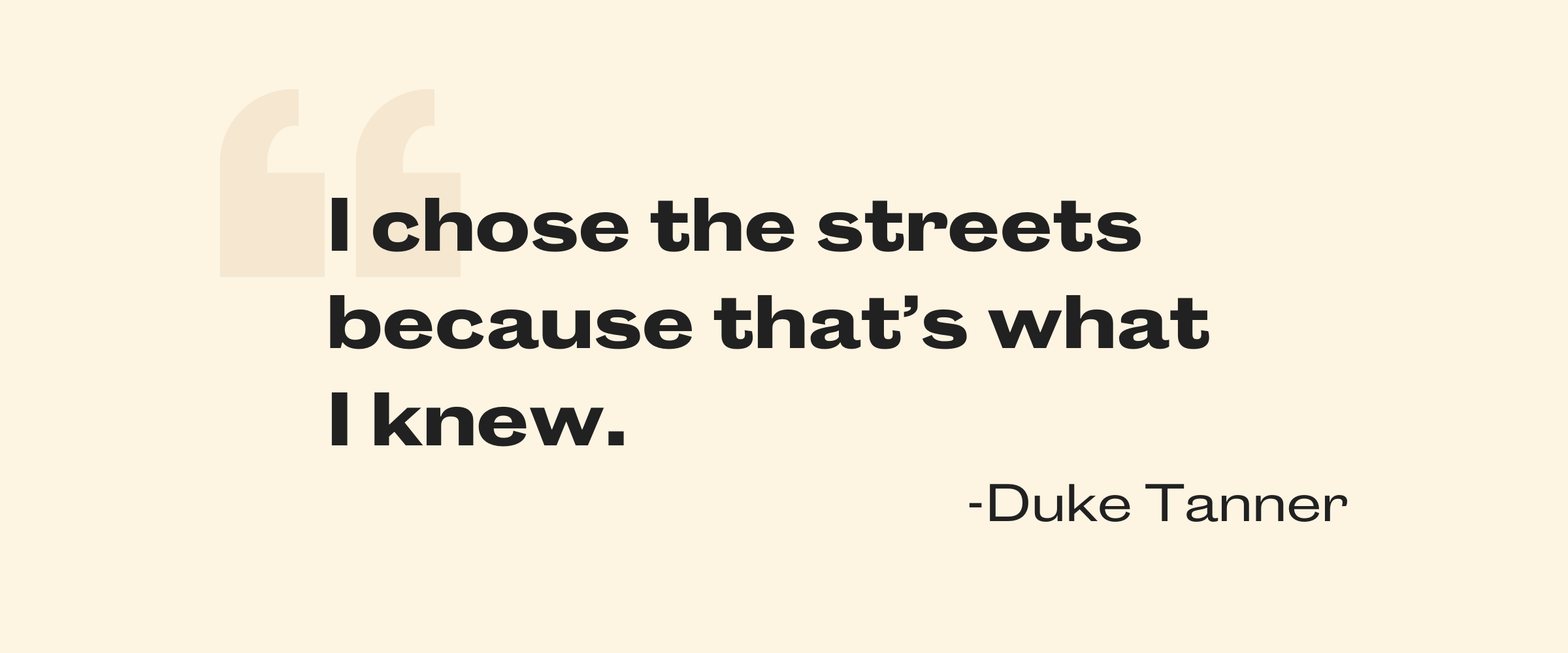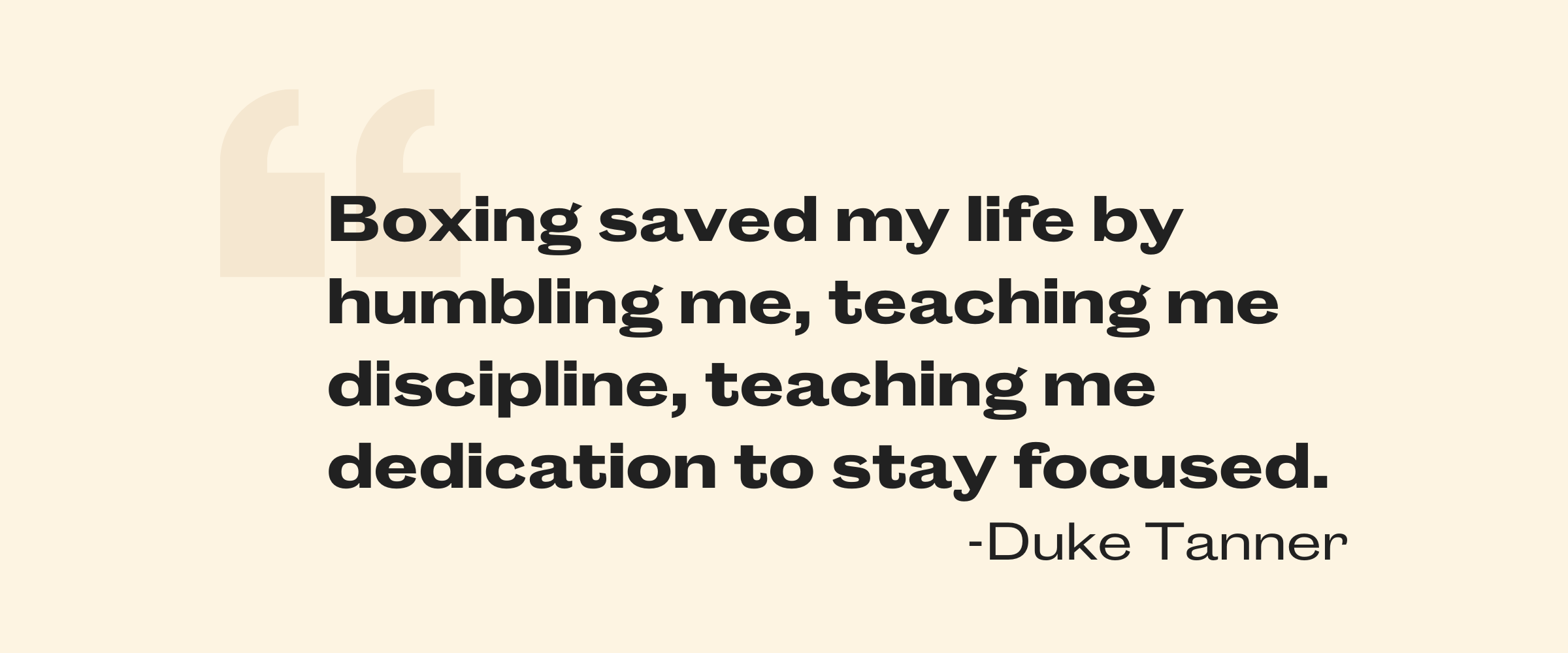When, in May of this year, Charles “Duke” Tanner received a full presidential pardon, he felt he had been given a new lease on life. The news came as a joyous daybreak. It had been more than twenty years since Tanner first received a life sentence in federal prison – twenty years since he was taken from his two-year-old son, Charles Jr., and placed behind bars for a first-time drug offense. It was an ordeal that tested Tanner in ways large and small.
But Duke Tanner, more than most, knows how to take a punch.
Born in Gary, Indiana, Tanner began his boxing career when he was six years old. He trained with William Murphy and Angelo Dundee, who famously trained Muhammad Ali. It was in the boxing ring that Tanner learned discipline, focus, and the ability to tolerate pain. The key was to stay on his feet, keep himself protected, and look for an opportunity to go for the win.
He turned pro at 18 years old, hoping to be able to provide for his family. “I wanted to get them out of there,” he says, “and I was using boxing to do it.”
 In the ring, he was a force to be reckoned with. He won his first 19 fights. He even participated in a televised fight on ESPN. One thing was clear: If you were a light heavyweight boxer during Tanner’s prime, the last words you wanted to hear were, “And, in the red corner…Charles ‘Duke’ Tanner.”
In the ring, he was a force to be reckoned with. He won his first 19 fights. He even participated in a televised fight on ESPN. One thing was clear: If you were a light heavyweight boxer during Tanner’s prime, the last words you wanted to hear were, “And, in the red corner…Charles ‘Duke’ Tanner.”
But his success as a boxer wasn’t leading to the financial security he and his family, including a young son, needed. He decided to try to make some quick money. “I chose the streets, ’cause that’s what I knew,” he says. As a result, along with his two brothers, he found himself involved in a nonviolent drug conspiracy. He was charged, tried, and received a double-life sentence.
Tanner was sentenced to serve in a prison known for its harsh conditions. When he interacted with his young son, it was usually through a TV screen – he was denied even the small dignity of an encounter through a glass window. Both of his parents died while he and his brothers were locked up. He was living through a dark night, and, without his faith in God, it might have consumed him.
 But what could’ve been a knockout punch turned into an opportunity for growth. While incarcerated, he took educational courses, completing hundreds of hours of programming. He found mentors, like Brother Darryl Muhammad, who shared his vision of creating a positive impact on the communities they left behind. He never lost hope that one day he would get home – and that, when he did, he was going to make a difference.
But what could’ve been a knockout punch turned into an opportunity for growth. While incarcerated, he took educational courses, completing hundreds of hours of programming. He found mentors, like Brother Darryl Muhammad, who shared his vision of creating a positive impact on the communities they left behind. He never lost hope that one day he would get home – and that, when he did, he was going to make a difference.
As the Obama administration launched an effort to commute the sentences of nonviolent drug offenders in the federal system, Tanner saw an opportunity; he started working on his clemency petition. Meanwhile, he helped other men on the inside fill out their petitions. Some of those men succeeded. Tanner, though, had his petition denied.
Still, he kept swinging. After President Trump took office, Tanner started writing letters to the White Office – one letter every Sunday, for two years. In 2020, one of those letters landed on the desk of Alice Marie Johnson, an advocate who herself had received a pardon from President Trump. She took Tanner’s case to the president, and the president listened. Tanner received clemency. He was able to go home, with one caveat: He would still have to serve the ten years on federal supervision.
Federal supervision was never intended to be a form of punishment. In practice, though, that’s how it functions. In order to travel anywhere, Tanner, who posed no public safety risk whatsoever, had to get permission from his probation officer. And even though Tanner’s PO was usually quite accommodating, Tanner still felt his freedom was constrained. That’s just a fact of life for people on federal supervision. If Tanner wanted to go visit his son, who was in college 90 minutes away, he would have to plan five days ahead. Impromptu visits were out of the question.

The conditions of supervision even led Tanner and his brothers to cancel a plan to spread their parents’ ashes. That’s because his brothers, recently freed by provisions of the First Step Act, still had their own federal supervision sentences to serve. Because of supervision conditions preventing people with criminal records from associating, the brothers needed to seek permission. But one of the brothers, Lamont, hadn’t been out of prison long enough so his probation officer denied the request. The plan had to be called off.
The loss of Tanner’s parents was compounded by being denied a chance to grieve them on his own terms.
Despite the indignities of supervision, Tanner resolved to live his life like someone who had been given a precious gift. He lived joyfully and gratefully. And he got to work trying to rebuild the community he had left behind all those years ago. He ran food drives. He worked as a community developer and helped local nonprofits access grants and other funding. And he started envisioning work on a larger scale to improve conditions for people in public housing.
“How can we motivate people when they have to spend most of their time in a home where the roof is leaking and there’s violence and broken bottles everywhere?”
He organized a group of men with whom he had served time, and together, they launched an effort to transform public housing into places where families can prosper, kids can feel secure, and people have opportunities to achieve their full potential.

“You wanna send guys coming home from prison back to the slums?” he says. “Let’s kill the slums and make a real community.”
Through it all, he hopes to be an inspiration to others. He wants parents to be able to tell their children about him, to point to him and say, “You see that guy, Duke Tanner? He got knocked all the way down and everybody thought he was knocked out. But he got up. He got a relationship with God. And look what he’s doing now.”
Look what he’s doing now. Ask anyone who knows Charles “Duke” Tanner, and they’ll tell you the same thing: He’s a man on a mission. As the founder of the Duke Tanner Foundation, he crisscrosses the country, speaking in churches and town meetings about the importance of fatherhood, unity, opportunity, and justice. When he’s not doing that, you can often find him fielding calls from government officials at the Department of Housing and Urban Development (HUD), offering guidance on how to expand opportunities for his community. He has also been a strong advocate for the Safer Supervision Act, federal legislation to modernize federal supervision.
He approaches these endeavors with the same tenacity he learned in the boxing ring, back when he thought his success in life could be measured by the punches he could take and the punches he could throw. “I think boxing saved my life,” he says, “by humbling me, teaching me discipline, teaching me dedication to stay focused. The sweet science of boxing taught me that.” Now every meeting, every interview, every challenge – they’re all just occasions to step back into the ring. He’s been bruised, but he keeps pushing.

He’s faced setbacks, but in our eyes — and in the eyes of all the people who place their hope in him – he remains undefeated.

Learn more about the Safer Supervision Coalition, a diverse group of organizations and leaders committed to reforming federal supervision by implementing evidence-based policies that will lower recidivism, incentivize successful reentry, and increase safety.
